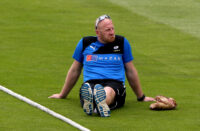Alison Mitchell says Zafar Ansari’s decision to quit cricket was no big surprise to his peers
To those who know or have spent time talking to Zafar Ansari, news of his retirement from all cricket at the age of just 25 would not have come as a great shock.
The Surrey all-rounder earned his first England ODI cap in 2015 and made his Test debut in Bangladesh in October. His subsequent tour of India was cut short by injury and he now admits he wasn’t quite ready for the international scene.
But instead of the experience providing him with the hunger to achieve more, the reality of the day-to-day life of an international cricketer seems to have confirmed to the Cambridge graduate that cricket would never fulfil or stimulate him sufficiently to continue with it as his career.
Speaking to BBC Stumped at Surrey’s media day earlier this month, Ansari articulated the social, emotional and intellectual challenges of adapting to a repetitive cricketing existence, revolving around hotel rooms, restaurants, airports and dressing rooms.
“Being in that environment, in that intense space, we were surrounded by security guards, we were stuck in hotels, we were stuck with each other for ten weeks,” he explained.
“You get to know yourself. When you’re abroad, you’re on your own with your own teammates and you have to be self-sufficient. There are coping mechanisms. I spent a lot of time watching BBC iPlayer – relying on those home comforts that seem normal.
“I suppose the other side of it is learning to be sociable in an effective way in that sort of environment. You obviously have to develop strong relationships with people if you’re going to be away for that length of time. Being a new player in that environment takes some effort. It’s not something that happens naturally. You’re having to understand different people and also judge how much you can be yourself and adapt to that environment.
“There is a degree of performance to it by necessity, but you have to remain authentic to yourself. It’s a balancing act. You watch the cricket on the TV and you only see the cricket, but you spend a lot of time off the field and that’s an important part of a trip like that.”
Ansari, being a socially confident person, found ways of fitting in and described the England camp as a very welcoming place. Bonds started to form through having breakfast every day and travelling on the team coach, but when he talks about the people he tended to gravitate towards during down-time, it becomes increasingly evident that Ansari needs more than the average dressing room conversations to stimulate him.
“There was Haseeb Hameed, who was new to the group and is a really intelligent, mature, nice guy, who I felt comfortable with,” he said. “Moeen Ali and Adil Rashid equally were very welcoming. It’s difficult to pick out individuals.. Chris Woakes…there were lots of guys who made the time easier and were very supportive. I’ve known Mark Ramprakash for a while and played a bit with him at Surrey. He was someone I felt I could go out for dinner with and chat about Donald Trump and other things that were going on in the world, and that was really nice as well.”
Ansari was brought up in a family of academics, and his curiosity about the wider world has never been hidden. His Double First in Politics, Philosophy and Sociology from Cambridge University lead to him doing a Masters in History at Royal Holloway, which he juggled both with his career at Surrey and his fledging start with England.
He wrote his 40,000-word dissertation (for which he earned a distinction) on the American Civil Rights Group ‘Deacons for Defence and Justice’. He became instantly animated when asked to elaborate on it.
“They were formed in the early to mid-Sixties, predominantly in Louisiana and Mississippi,” he states with enthusiasm. “They challenged the dichotomy between violence and non-violence that we, since the civil rights era, have come to think of as defining that period. So yeah, it was a way of reading a lot of really interesting literature about a period of time that I find interesting – racism, criminal justice and the way they interact in America.”
Ansari has always said that he saw cricket as a part of his life, as opposed to his whole life, and the signs were there three weeks ago that he was contemplating where cricket’s role sat in the wider context of his world.
“It’s about balancing that reality while appreciating its insignificance in a broader way,” he said. “I’m trying to work it out. I do struggle with the sole emphasis on anything I suppose, but on cricket for sure.” A few weeks on, and Ansari has now worked it out. A likely career in law beckons, where he will no doubt excel, and he takes with him the best wishes of all those who have watched, worked and played with him.
Alison Mitchell presents the BBC World Service podcast, Stumped. Hear more from Ansari here
This piece originally featured in The Cricket Paper, April 28 2017
Subscribe to the digital edition of The Cricket Paper here















